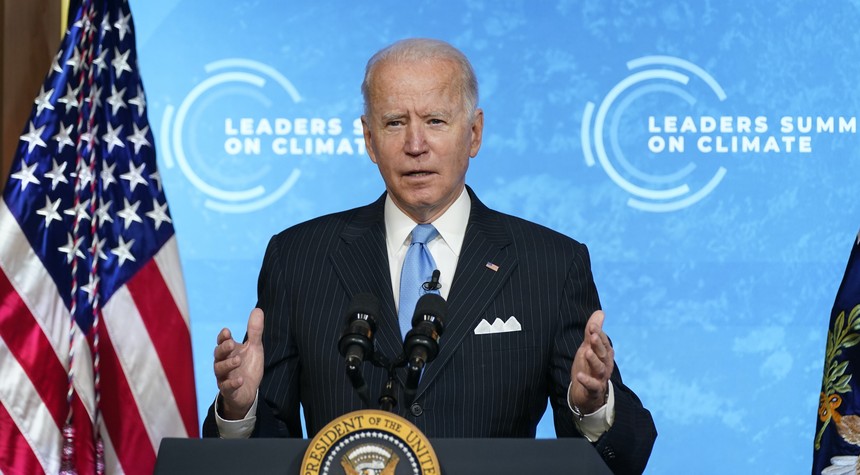(The opinions expressed in guest op-eds are those of the writer and do not necessarily represent the views of RedState.com.)
According to AAA, the average price of a regular gallon of gasoline settled at $4.65 on Tuesday.
The Energy Information Administration further reports that the three-month average price of gasoline for April, May, and June of this year was $4.59, the highest three-month average in U.S. history.
These outrageously high gas prices are not only hurting drivers. They are also having a far-reaching effect on inflation and the price of goods and services across the entire economy, which now appears to be teetering on the brink of a major recession. The U.S. Bureau of Labor Statistics (BLS) reports, “From May 2021 to May 2022, the Consumer Price Index for All Urban Consumers increased 8.6 percent, the largest 12-month increase since the period ending December 1981.”
With all of these figures in mind, it should go without saying that now is not the time to embrace tactics designed to raise the cost of oil and gas, but, stunningly, that is exactly what an alliance composed of the Biden administration, Wall Street firms, banks, corporations, and the United Nations are doing.
On June 15, the United Nations-backed Race to Zero campaign announced that it has tightened its already strict energy policies for its extremely large, exceptionally powerful membership group, pushing the world toward an even greater energy crisis.
According to the United Nations:
“Race To Zero is a global campaign to rally leadership and support from businesses, cities, regions, investors for a healthy, resilient, zero carbon recovery that prevents future threats, creates decent jobs, and unlocks inclusive, sustainable growth.
“These ‘real economy’ actors join 120 countries in the largest ever alliance committed to achieving net zero carbon emissions by 2050 at the latest.”
One of the most important Race to Zero partner coalitions is the Glasgow Financial Alliance for Net Zero (GFANZ), a large group of “leading financial institutions committed to accelerating the decarbonization of the economy.”
GFANZ is composed of many of America’s leading financial institutions, asset managers, insurance companies, and banks, all of whom have pledged to adhere to Race to Zero and GFANZ guidelines.
GFANZ’s membership includes Bank of America, BMO Financial Group, Barclays, Citi, Wells Fargo, JPMorgan Chase, BlackRock, State Street Global Advisors, Vanguard, Allianz, and many others. Together, GFANZ and Race to Zero members control more than $130 trillion in assets, more than six times the size of America’s GDP.
Although GFANZ and the Race to Zero are not government-controlled, they have received significant support from governments across the world, including from the Biden White House. The Biden administration has heavily promoted GFANZ, coordinated with its members and leadership, and even participated in its launch event.
The Race to Zero policy changes announced on June 15 substantially increased the commitments of GFANZ and Race to Zero members. Under the new policy, existing members will be required within just one year to “phase down and out all unabated fossil fuels as part of a just transition.”
Race to Zero’s website further notes, “In practice, this means corporations and investors must restrict the development, financing, and facilitation of new fossil fuel assets, which includes no new coal projects.”
Members will also be required to publicly disclose within one year a “Transition Plan” indicating how they are working toward their net-zero emissions commitments, including how they plan to go net-zero for “all scopes of emissions, both in their interim and long-term targets. For financial institutions, this includes all financed/portfolio/facilitated emissions.”
In other words, according to Race to Zero, America’s largest financial firms, investment managers, and asset owners must commit, both in the short and long terms, to starving all fossil-fuel companies of the capital needed to operate.
And that’s not all. In perhaps the most remarkable part of the policy change, Race to Zero indicated that it will now require members to lobby in favor of government policies that will promote Race to Zero’s views on climate change, effectively turning thousands of the world’s most powerful private businesses into a propaganda operation for many left-wing politicians.
According to Race to Zero, this part of the policy change is called “Persuade,” and it will, in the group’s own words, mandate that members “align their lobbying and advocacy activities with net zero by proactively supporting climate policies at the subnational and national level consistent with the Race to Zero criteria.”
If current members of Race to Zero and GFANZ choose to remain in the association and thus adopt its new guidelines, then the global energy crisis is going to get substantially worse. Access to capital, insurance, and perhaps even basic banking services for fossil-fuel companies will be phased out, driving energy prices up to levels we’ve never seen before in the United States.
Why would these coalitions take such reckless action? The true motives behind the thousands of leaders involved with Race to Zero vary significantly, but their stated purposes are unquestionably the same: to stop climate change.
Whether you think that goal is noble or not, hopefully, we can agree that voters and democratic institutions should decide whether to effectively blow up the existing energy system in the midst of a growing economic crisis, not elites in Wall Street firms, large banks, corporations, and the United Nations.
Americans are running out of time to put the brakes on this out-of-control movement. Congress and the American public must demand change in the financial sector now, before the damage done to the global economy is too great to reverse.

